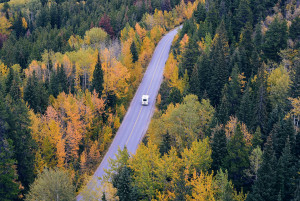 Don’t let fuel costs stop you from purchasing your dream motorhome
Don’t let fuel costs stop you from purchasing your dream motorhome
You might picture yourself on the open road, lush trees and sparkling lakes rolling by. Maybe you love the idea of packing up the family to visit exciting places, all while having the comforts of home. But there may be one thing holding you back—gas mileage.
The worry that gas for an RV will cost a fortune is one of the most common barriers to purchasing one. Let’s take a closer look.
Motorhome manufacturers often list gas mileage to be higher than reality for most people. They calculate fuel consumption under ideal conditions, for example, highway driving at optimum speed. We suggest using 10 miles per gallon, converted to litres for easy figuring is 24 litres/100 kilometres, which is about half that of a car. But the tanks are much larger than a car.
So, an RV will typically travel about the same distance, or greater than a car between fill-ups, but cost roughly twice as much to fill up. This is true whether you’re towing your trailer or driving a motorhome. This may seem to confirm your fears of costly gas mileage. But let’s look at how much travel people usually do over the course of a year.
People don’t drive their RVs every day like they do their car. They generally do a series of RV trips each year. For each trip, they drive to their destination, stay for a holiday and drive back.
For example, a trip from our location in Hamilton, Ontario to Miami, Florida is roughly 2,300 kilometres. If you calculate 24 litres, divided by 100 kilometres, multiplied by 2,300, multiplied by $1.30 per litre, it is about $717 in gas to get to Florida.
A trip to Prince Edward Island is 1,750 kms. This would cost about $546. To travel to Algonquin Park from our location is 337 kms, which would cost $105.
Most people take even shorter RV trips on weekends, to nearby provincial parks and private campgrounds, with maybe one or two longer trips a year.
Gas is actually a nominal cost, especially considering wherever people go they have the comfort of their motorhome, can cook their own meals, save on accommodations, bring the family and pets and have the freedom to stay for as long as they want and come and go as they please.
There are also a few ways to cut RV fuel costs:
Fill up at a station with more competitive prices or a discount gas card
Consider a smaller RV, (but keep in mind compromising on the size of RV you want truly isn’t worth it as the savings on fuel mileage are negligible.)
Look at RVs with more efficient diesel engines; however, based on the typical fuel costs outlined here, we don’t believe the premium price for these motorhomes is justified if you’re considering fuel costs alone.
Maintain your RV, including the correct tire pressure, to lessen gas consumption
Slow down or drive the speed limit on highways to avoid guzzling too much gas
Travel with empty water tanks and fill up with water when you arrive at your destination, to save on weight.
If you have any questions on motorhome fuel consumption or need any other information on RVs and RV travel, please contact us!
